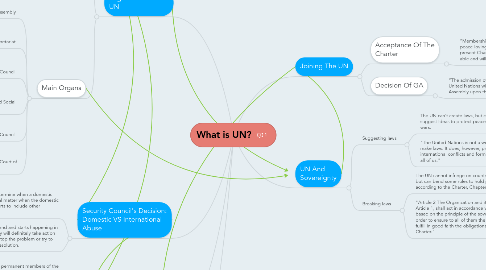
1. Organization of the UN
1.1. Permanent 5
1.1.1. The Republic of China,
1.1.2. France
1.1.3. The Russian Federation
1.1.4. The United States of America
1.1.5. United Kingdom of Great Britain and Northern Ireland (they're counted as one member since Norther Ireland is in the territory of the UK)
1.1.6. What they do?
1.1.6.1. Since the Permanent 5 have been in power for quite a while, the UN probably does want to preserve its power, but, the UN tries to make the world a better place which is what they were essentially made for. So the UN probably values both equally.
1.1.6.2. The Security Council should determine when a domestic matter becomes an international matter when the domestic matter gets out of hand and starts to include other countries. When the abuse or war gets out of hand and starts happening in the Permanent 5’s country’s, then they will definitely take action and use their military power to help stop the problem or try to resolve the problem and come to a resolution.
1.2. Main Organs
1.2.1. General Assembly
1.2.1.1. The General Assembly is the main and representative organ of the UN and makes the policies and laws. They discuss all the important things.
1.2.2. Secretariat
1.2.2.1. The Secretariat does administrative and substantial work of the UN and is directed by the General Assembly.
1.2.3. Trusteeship Council
1.2.3.1. The Trusteeship Council was established to help ensure that trust territories were administered in the best interests of their inhabitants and of international peace and security.
1.2.4. Economic and Social Council
1.2.4.1. The Economic and Social Council is responsible for coordinating the economic, social and related work of 14 UN specialized agencies.
1.2.5. Security Council
1.2.5.1. The Security Council has primary responsibility for the maintenance of international peace and security.
1.2.6. International Court of Justice
1.2.6.1. The International Court of Justice is to settle, in accordance with international law, legal disputes submitted to it by States and to give advisory opinions on legal questions referred to it by authorized United Nations organs and specialized agencies.
2. Security Council's Decision: Domestic VS International Abuse
2.1. The Security Council should determine when a domestic matter becomes an international matter when the domestic matter gets out of hand and starts to include other countries.
2.2. When the abuse or war gets out of hand and starts happening in the Permanent 5’s country’s, then they will definitely take action and use their military power to help stop the problem or try to resolve the problem and come to a resolution.
3. Global Progress And The Power Of Permanent 5
3.1. To start off, the Permanent 5, consist of 5 permanent members of the security council. These members are, the Republic of China, France, the Russian Federation, the United Kingdom of Great Britain and Northern Ireland, and the United States of America are all a part of the Permanent 5.
3.2. Global Progress
3.2.1. The UN probably balances both promoting Global Progress and preserving the power of the Permanent 5.
3.2.2. Since the Permanent 5 have been in power for quite a while, the UN probably does want to preserve its power, but, the UN tries to make the world a better place which is what they were essentially made for. So the UN probably values both equally.
4. Why Join The UN
4.1. Countries want to join the UN for peace. The text states “to save succeeding generations from the scourge of war, which twice in our lifetime has brought untold sorrow to mankind.” This basically means that the UN will help with preventing war. If countries do not want to be at war, UN would have them be at peace.
5. Joining The UN
5.1. Acceptance Of The Charter
5.1.1. “Membership in the United Nations is open to all other peace-loving states which accept the obligations contained in the present Charter and, in the judgment of the Organization, are able and willing to carry out these obligations.”
5.1.1.1. So, the obligations have to be agreed with of the Charter in order to join. This seems fair for the membership process because in the preamble, basically all of the ideas are ideological and peace-loving, so it seems reasonable for the country to agree with it.
5.2. Decision Of GA
5.2.1. “The admission of any such state to membership in the United Nations will be affected by a decision of the General Assembly upon the recommendation of the Security Council.”
5.2.1.1. This seems fair because the GA and Security Council is made up of different countries and it is not just one person’s opinion. It is a whole organ and they take many people’s opinions.
6. UN And Sovereignty
6.1. Suggesting laws
6.1.1. The UN can't create laws, but can suggest Ideas to protect peace and end wars.
6.1.2. "The United Nations is not a world government and it does not make laws. It does, however, provide the means to help resolve international conflicts and formulate policies on matters affecting all of us."
6.2. Breaking laws
6.2.1. The UN cannot infringe on country's Sovereignty, but can bend some rules to hold peace, as according to the Charter, Chapter 1, article 2.
6.2.2. "Article 2 The Organization and its Members, in pursuit of the Purposes stated in Article 1, shall act in accordance with the following Principles. The Organization is based on the principle of the sovereign equality of all its Members. All Members, in order to ensure to all of them the rights and benefits resulting from membership, shall fulfill in good faith the obligations assumed by them in accordance with the present Charter."
6.2.2.1. Basically, they cannot control a member's power, but can pass suggestions and have "universal" ideas by agreement of all of the members.

